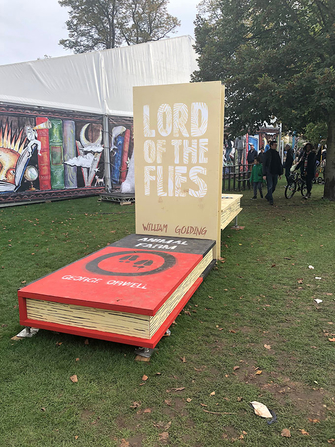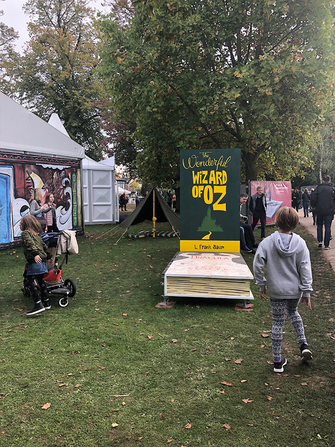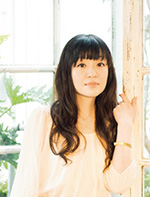The day I started eating the world
2019.10.2
Sayaka Murata (Novelist)
Convenience Store Woman, by Japanese novelist Sayaka Murata, has been attracting attention as a best seller in Japan. After the release of its English edition in 2018, the book quickly caught the eye of critics of the major U.S. newspapers. The New Yorker magazine selected it as one of The Best Books of 2018. Murata visited the U.K., the U.S. and Canada under a program organized by the Japan Foundation and communicated with her readers in various places. She describes her experiences in the U.K.
Last year, in October 2018, I went on an important trip. It was only when I was settled in the plane that I realized that previously I'd only ever traveled when I'd been invited by someone. This time, however, I'd been invited not by a person, but by my own novel. My novel had already arrived ahead of me. It had been reborn in words I couldn't read, and I'd heard that it was in bookstores dressed in different covers from it had been in Japan. I'd even seen photos of it, but it was like something in a dream. I wanted to see it there with my own eyes, so I decided to travel abroad in pursuit of it.
On the morning of October 6th, I boarded a plane to England. First I was to take part in Cheltenham Literary Festival. It had already been decided that I would appear at the Toronto International Festival of Authors at the end of October, and I was worried whether I was physically up to it, but I received such a warm message from the Japan Foundation that I decided to go. My editor, who is proficient in English, was worried about me traveling alone and so she came with me. I felt bad about having so many people looking out for me, but as the plane took off I had the feeling that my decision had been the right one.
I can hardly speak any English and have no sense of direction, and so whenever I travel it's like being teleported somewhere. I board a great big carrier, stoically endure it for a number of hours, and before I know it I've arrived someplace called Faraway. Still unable to fully grasp just how far away it is from where I live, I disembark in Faraway and travel around. Even after studying a globe of the world, I still can't dispel that sensation.
When, after more than twelve hours I arrived at Heathrow Airport in Faraway, it smelled differently to Japan. "It's raining," my editor murmured. Air that was different from Japan's entered my body.
We were taken by car from the airport to Cheltenham. Cheltenham Literary Festival is the oldest literary festival in the U.K., and it seems to involve the entire town. On the way there, I fantasized about the type of people who would be there, and the works they would be discussing.
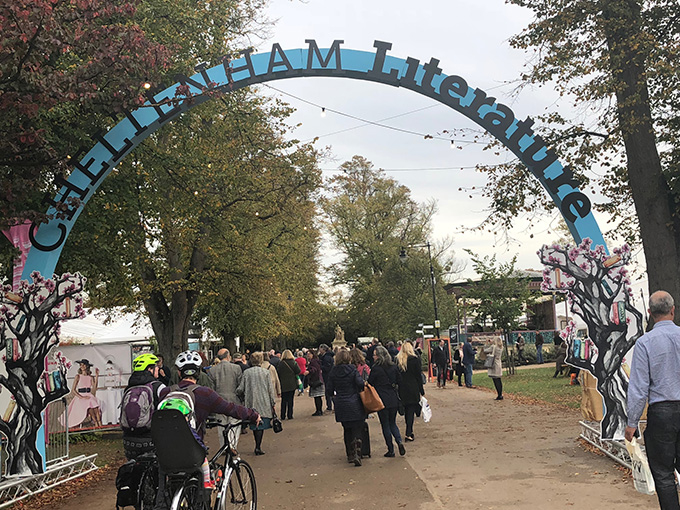
The Cheltenham Literary Festival is the oldest event of its kind in the U.K.
Upon arrival in Cheltenham, we met up with Ginny Tapley Takemori, who translated Convenience Store Woman into English. Without Ginny, all the people attending the literary festival wouldn't have been able to read the story I wrote, and would only have been able to gaze at the squiggles on the page of the strange language called Japanese. This makes me think that Ginny is like a magician. I was thrilled to be able to be together with her in England.
That night I slept like a log and woke up at 2 a.m. the next morning. At last the day had come for me to appear on stage. The Festival site was right next to the hotel, and was much more vibrant and lively than I had imagined, with colorful tents and displays. It was full of people, with small children running merrily around too.
There were also a lot of people in the Writers' Room when I arrived. This was where participants—writers, translators, interpreters, and moderators—gathered, and they were all talking together. Some were laughing, others serious. Naturally it was all in English and I couldn't understand a word.
As someone who has always been cooped up in Japan, just being in here I could feel my mind being stirred up. Everyone gathered here was involved in some way or another with writing. Words that I myself couldn't speak freely were flying about between them. It was so stimulating and also unbearably frustrating. I was desperate to know what kind of stories they were involved in, what kind of words were dormant in their bodies, but I was literally lost for words.
The festival site was vibrant and lively with colorful tents and displays. It was full of people, with small children running merrily around.
People who had read my novel came to speak to me, and gave me their thoughts in English. I couldn't understand what they were saying, but I could get an idea from their expressions and gestures. At my side, my female interpreter converted their words into Japanese for me so I could understand what the person right in front of me was communicating to me. I thanked them in Japanese. Two types of sound were going back and forth. Even though we were the same kind of creatures, we issued different sounds. Sentences with the same meaning were regenerated in a different language and repeated. It's only natural when abroad, of course, but still, I was extremely impressed by it. The meaning itself as an intangible entity that can be exchanged with certainty even after being recast in different words was being distilled to mysterious purity to become an invisible, beautiful soul. I could feel the weight of this unadulterated soul pour into my body.
I appeared at two events at the Cheltenham Literary Festival. The first was a discussion about Japanese literature together with women translators Ginny and Polly Barton. The second was together with Ginny and focused on Convenience Store Woman as well as my novels and creative work.
The audiences were all warmly receptive, and their love of literature was evident in the questions they asked. I was struck by how many of the questions were by people hoping to become translators, especially in the first event. For the first time in my life, I signed my own book in English translation. I wondered whether I should sign my name in Roman letters, but in the end I decided to do it the same way I do in Japan, in kanji [村田沙耶香] and stamping it with my seal. Lots of people asked me about the stamp, and I realized that I was using it without really knowing the meaning of it. I bumbled some kind of explanation, but when I looked it up later I found I'd got it all wrong.
After my events were over, I spent some time wandering around the festival site. One tent occupied by a bookstore was filled with books, which didn't have an obi—a paper band over the cover printed with a blurb—like Japanese books do, and the atmosphere was quite different so it was fun looking around. There were some books by Japanese authors, but most were not yet available in Japanese translation (I think). I wanted to buy one, and chose a volume titled Japanese Death Poems, which appeared to be a collection of poems written by Zen monks and haiku poets on their deathbeds. I thought I might be able to understand this given the subject matter, but when I got back to the hotel and started flicking through it I found it was harder than I thought. Still, I was happy to have a book that I'd bought at the festival in my luggage.
The next day we went to London for an event at Foyles bookstore. The editor and publicist from the U.K. publisher, Granta, came along and I was able to meet them in person for the first time. I'd been looking forward to meeting them for ages, so I was really happy.
Ginny and I did a short reading in Japanese and English, then we discussed the book, my creative work, and the translation. The audience here, too, was extremely warm and enthusiastic. Maybe because I'd been so nervous at the literary festival, here I was able to relax a little as I spoke. Talk shows are a bit like jam sessions, I think. Unexpected words can come flying out depending on the atmosphere and the other participants and the flow of the talk. And this time, words that could probably only materialize at this particular event came tumbling out from within me.
I was really touched that many people in the audience came having already read Convenience Store Woman. I had already noticed in Cheltenham how participants were relaxed on stage, or so I thought, sitting back with their legs crossed as they talked, and I was getting the feeling now that this is typical of events abroad. There is a more intimate atmosphere than at events in Japan, and I have the impression you can talk more deeply about things that way, so I thought of imitating them and crossed my legs, but I couldn't really do it after all and ended up sitting with my knees together and back straight as I talked, just as I do in Japan.
Everyone was calling the protagonist Keiko Furukura by her first name as if she was a friend. Why did Keiko feel this way? How did Keiko feel about that? In Japan most people call her "the protagonist" or "Miss Furukura," so this was refreshing. I was gradually beginning to feel that Keiko was my friend, too. Thanks to the powers of my amazing interpreter, I had the feeling that the words I spoke sparkled as they flew away. They felt purer than when I uttered them, and seemed to shine several times more brilliantly.
I recalled that the interpreter had rendered my words as "Keiko is everyone," although I might be mistaken since she didn't remember this when we met another day. It gave me quite a start, as I did somehow think that Keiko was inside everyone, and these were the very words I wished to encounter.
After the talk I again signed more books. I myself only said "Hello" and "Thank you" in English, while the interpreter sat next to me helping me with the conversations. A lot of the audience was interested in Japan, some said they didn't understand Japanese but they wanted me to write their names in hiragana as I signed their copies, and others were studying Japanese at university and said they were going to try reading my books in the original. During the talk, I had referred to a story I wrote called "Triples," about a society in which love between three people was common, and one person came up to me afterwards and said with a smile, "I'm in a threesome, just like in that story you wrote."
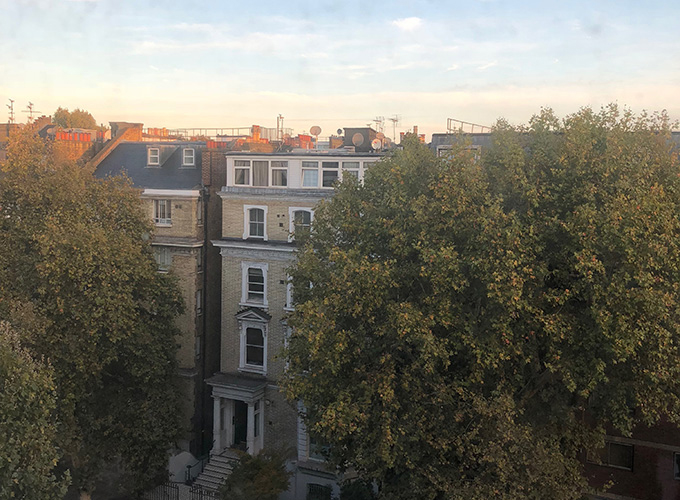
London landscapes, as viewed through Sayaka Murata's hotel window.
This was my first trip abroad as an author, and everything was important and unforgettable for me. After my author experience was over, I enjoyed sightseeing in London with my editor, but before I went to sleep all my experiences as an author abroad came back to me. I recalled the excitement I'd felt as a child when I wrote my first story. It occurred to me that then and now were connected, and I'm a little embarrassed to admit it, but I was taken back to how I'd felt as a child and quietly wept. I never did get over jet lag, and when I awoke at 2 a.m. I sat gazing absently outside.
I was eating the world I'd newly encountered with my whole body. I'd made any number of trips before, but it was the first time in my life I'd felt like this. For 38 years I'd been eating the world called Japan, but now I was beginning to change. New words and experiences were rapidly entering my body, and transforming me into a different creature. I was disoriented by this but it also felt incredibly pleasant and moving.
Even after my trip was over, the world that my body had eaten remains inside me even now. Straight after this I flew to Canada and America, where I had a really treasured, unforgettable experience. At the beginning of this year I returned to England, and again exchanged precious words. And I have two more trips lined up after I finish writing this. From now on I will continue to eat the world I encounter. I will never as long as I live forget this first trip that started it all off. The words that welled up within my body during it are still bubbling inside me even now. I am impatiently looking forward to seeing how I will go on transforming through my travels in the future.
Translation: Ginny Tapley Takemori
Back Issues
- 2023.12. 7 Movie Theaters aroun…
- 2023.6.16 The 49th Japan Found…
- 2023.4.24 The 49th Japan Found…
- 2022.12.27 Living Together with…
- 2022.12.27 Living Together with…
- 2022.8.12 Inner Diversity <…
- 2022.3.31 The 48th Japan Found…
- 2022.3.29 Beyond Disasters - T…
- 2021.11.29 Crossing Borders, En…
- 2021.4.13 Crossing Borders, En…


